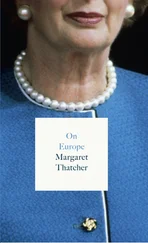For our part, Western countries have to make this clear to Moscow, so as to reduce any Russian temptation to bully. The best way to do this will be to take the Baltic states into NATO. The timing, though, is important. We should always aim to inform the Russians of our intentions well in advance and try to reassure them that our actions pose no threat to Moscow’s interests. President George W. Bush was, therefore, right to signal very clearly before he went to Slovenia for his first meeting with President Putin that he believed that the Baltics must indeed be brought within NATO. *It will be necessary to reiterate this at some point, so that Moscow is not misled into thinking that its cooperation in the war against terrorism has won for it a veto on NATO’s expansion. But when we do take the final step, bringing the Baltics or indeed any other state within the Alliance, we should know what we mean and mean what we say – for, let us never forget, NATO membership is not merely symbolic. It implies that we would fight to preserve the territorial integrity of each and every member state.
Equally important from the viewpoint of Western interests is the future of Ukraine. There was rather more excuse for the Russians to begrudge Ukraine its independence than the Baltics. Kiev was, after all, from the ninth to the twelfth centuries the centre of Kievan Rus, the predecessor of the Russian state. Large numbers of Russians still regard Ukraine as part of Russia. Mainly Orthodox Eastern Ukraine feels closer to Russia than does the fiercely independent west, which is predominantly Uniate. Potentially serious disputes between the new Ukrainian state and Russia existed as regards the fate of the Black Sea fleet and the future of Crimea. The fact that in the first years after independence Ukraine made even less progress along the path of economic reform than its Russian neighbour also raised questions about the country’s prospects and indeed viability.
The government of President Kuchma, whatever its other shortcomings, in fact managed to resolve most of Ukraine’s outstanding problems with Russia. A Ukraine is emerging which recognises its historic ties with its eastern neighbour, but which also looks to the West. Ukraine is large enough – with fifty-one million people – and potentially wealthy enough – its soil is rich, though its economy is in terrible shape – to be a pivotal country in Eastern Europe. It is thus also important to us in the West. Ukraine is not to be treated as falling within a Russian ‘sphere of influence’. Rather, a strong Ukraine will act as a buffer between Russia and NATO. That would also probably be good for both parties.
In order to plot a path of independence, while seeking to resolve disputes as amicably as possible, Ukraine has vigorously resisted Russian attempts to turn the CIS into a pale imitation of the Soviet Union. *At the other extreme, Belarus’s President Lukashenko has consistently sought to reunite his autocratically ruled state with Russia in a new political, military and economic union.
Most of the other former Soviet republics have pursued a path somewhere between the two, often altering course according to the requirements of the moment. The five Central Asian Republics were all initially keen to join the CIS. None of them had been used to controlling their own affairs, which had been planned from Moscow, and their economies were still heavily dependent on links with Russia. But as the years have passed, other developments have affected their orientation – developments which are of some importance to the West.
First, the ethnic identity of the peoples of Central Asia has assumed greater significance. Four of the five states’ populations – the majorities in Kazakhstan, Kyrgyzstan, Turkmenistan and Uzbekistan – share a common ethnic origin with the Turks. Although Turkey does not share a border with these states, it is active in the region and its influence as a prosperous, powerful, Westernised state is likely to grow.
Second, in the aftermath of the collapse of communism Islam has assumed much greater importance. It provides a rallying cry against corruption and abuses of power in Central Asia as elsewhere.
Third, partly in response to these perceived challenges – ethnic tension affecting local Russian populations, the influence of outside powers, above all the growth of Islamic militancy – Russia has reacted forcefully. There were thousands of Russian troops deployed in the Central Asian Republics long before the region became strategically crucial to America’s campaign against the Taliban. Moscow provided strong support to the Tajik government in its war with Islamic forces. It stations seventeen thousand Russian troops on the border. Russia also backed Kyrgyzstan with military aid in 1999, and has 2500 troops there. Fifteen thousand more are based in Turkmenistan.
In June 2001 the Moscow-led reaction to Islamic insurgency took what now appears a significant step further. Russia, China and the four Central Asian states of Kazakhstan, Kyrgyzstan, Tajikistan and Uzbekistan agreed a security cooperation treaty in Shanghai. It was explicitly aimed at resisting Taliban-sponsored terrorism across frontiers. *
Three months later, in the wake of the attacks on New York and Washington, the Central Asia region acquired a sharply increased significance. In order to launch campaigns against al-Qaeda and the Taliban, while seeking to minimise potentially destabilising operations from Pakistan, the US sought the cooperation of the states bordering Afghanistan to the north. The governments of Uzbekistan and Tajikistan agreed, the former with particular enthusiasm, to welcome US bases. Kazakhstan also allowed the US to use its air space. The Uzbeks and Tajiks had their own special reasons to cooperate against the Taliban. But, as the dominant power in the region, it was Russia’s support for US aims that was crucial in overcoming local fears and hesitations. (I shall examine later the implications of this for US–Russian relations in the longer term.)
Central Asia is also of strategic importance for economic reasons. It possesses great reserves of oil, natural gas, gold, silver, uranium and other valuable natural resources. Oil and gas, though, are the most important. It has been estimated that Kazakhstan and Turkmenistan together with Azerbaijan have oil reserves larger than those of Iran and Iraq. The known gas reserves of Turkmenistan alone are twice as large as those of the North Sea. Kazakhstan’s Tengiz oilfield is one of the world’s biggest. And by some accounts its Kashagan field, discovered in early 2001, is bigger still.
Oil and gas are equally crucial to the affairs of that ethnic tinderbox, the Caucasus – not just because of Azerbaijan’s reserves but because of the need for pipelines to exploit the fabulous energy wealth of the whole Caspian region. Russia is determined to maintain control over this oil and has engaged in this new ‘Great Game’ as vigorously as it did the old. It has sought to ensure that Azerbaijan and the Central Asian Republics use Russian oil- and gas-pipelines from the Caspian to its Black Sea port of Novorossiysk. *Russia has shown in recent years that it can cause a great deal of trouble in pursuit of its perceived interests. In a region where convoluted conspiracies and counter-intuitive theories thrive one should be careful about ascribing particular actions to particular actors. But it seems clear that Russia backed the overthrow of the first post-Soviet President of Georgia, Zviad Gamsakhurdia, in January 1992; and that it then supported a separatist revolt in Abkhazia in order to drive Georgia into the CIS, where it could keep it under firmer control. Similarly, in Azerbaijan in 1993 the upright, pro-Western democrat President Abulfaz Elchibey, who wanted to agree with a Western consortium a contract for the exploitation of Azeri oil – thus excluding the Russians – was immediately put under huge Russian pressure. Russia cut off Azerbaijan’s oil exports and used Armenia to increase the long-standing difficulties over Nagorno-Karabakh. Finally, when all else failed, Mr Elchibey was dislodged in a coup and the former Soviet Politburo member Haidar Aliev was installed in his place. And when Mr Aliev proved more recalcitrant than the Russians expected they backed two attempted coups against him.
Читать дальше












